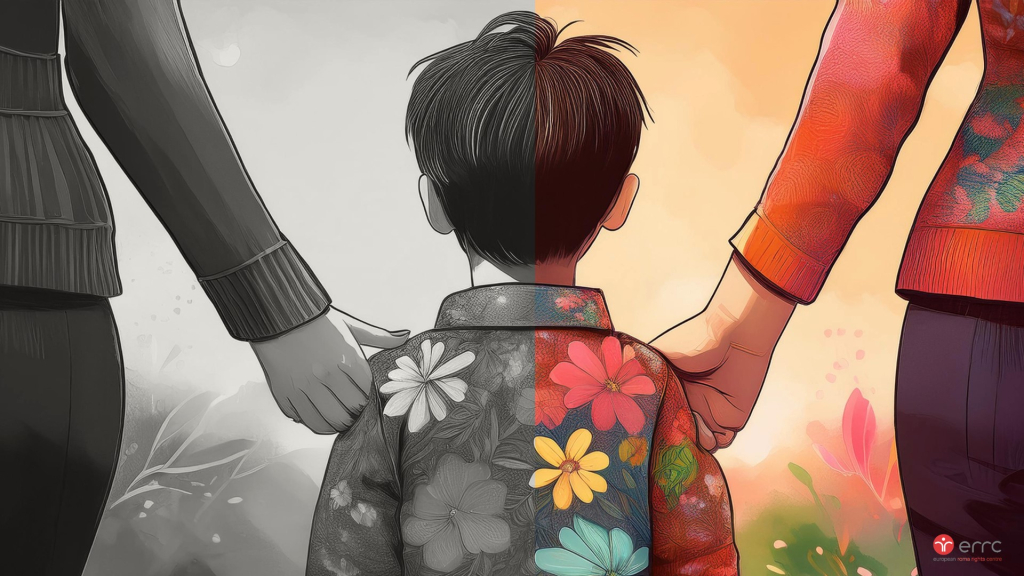Child Removal from Low-Income Romani Families Raises Severe Human Rights Concerns in Bulgarian Child Welfare System
30 September 2024

By Judit Ignac
Recent cases in Bulgaria have shed light on significant human rights issues within child welfare practices, particularly affecting vulnerable, low-income families, mainly of Romani origin. The European Roma Rights Centre (ERRC) and the Equal Opportunities Initiative are supporting two important legal proceedings representing two different families: the Marinov and Kovachev families. Both highlight crucial issues regarding family rights and potential injustices within Bulgaria's child protection system. The removal of children from their families by child protection services is deeply concerning—mainly when it is based on poverty alone and occurs without clear explanation, substantial justification, or properly informing the family. While this practice should aim to protect children, it frequently fails to address the root causes of family struggles, leading to discriminatory practices, human rights abuses, and unnecessary trauma for both children and parents.
Marinov Family
The Marinov family—parents Andrey and Ivanka and their four children—faced a challenging situation when the children were removed on the grounds of poverty and placed in a Family-Type Accommodation Centre (FTAC). Andrey recently applied for legal recognition of their guardianship of three of the children, while the youngest was already recognised at birth. On August 1, 2023, the eldest child returned to live with his grandfather without informing his parents, prompting them to seek help from the Second District Police Department in Sofia to locate their son.
On January 12, 2023, police found and detained the eldest child at a Home for Temporary Accommodation of Minors in Sofia. Andrey was informed that his four children would be transferred to back to the FTAC. Child Protection employees took the other three children from Ivanka, who claims she was misled—they told her the children would be taken to the Second Regional Police Department for pickup after an hour rather than informing her of their placement in the FTAC.
The parents filed a complaint with Sofia City's Administrative Court, and a child rights lawyer was hired to represent them. In April 2023, the lawyer discovered an administrative order placing the children in FTAC for 3 years and mandating the parents to attend sessions to improve their parenting skills. The lawyer raised concerns that bias regarding the family's ethnicity and economic status affected the officer’s decision on parental skills sessions after just a single home visit, concluding that the family’s living conditions were below the poverty line.
During this time, their eldest son reported instances of abuse and harassment at the FTAC, both towards himself and his siblings. On July 11, 2024, the Marinov family initiated legal actions with the Elin Pelin District Court to reintegrate the children into their family. Social Services supported the reintegration, and after open hearings on August 5, 2024, the court ruled in favour of the family on August 29, 2024. The lawyer's request for immediate execution was granted, paving the way for the family's reunion.
Kovachev Family
Aleksandar and Elena are young parents struggling to keep custody of their newborn son, Stefan. Despite Aleksandar’s willingness to care for his child and partner, authorities placed Stefan in a “Mother and Baby Unit,” effectively separating the family. Aleksandar encountered significant obstacles in obtaining legal recognition of his child, with authorities refusing to accept his declaration of paternity. The Shumen Social Service Directorate (SSD) cited concerns about his ability to provide the necessary living conditions and resources despite Aleksandar’s expressed intention to care for both mother and child. Social services employees allegedly threatened Aleksandar with imprisonment for his relationship with Elena.
An appeal against the SSD's order was filed, leading to ongoing court proceedings, and transferred to the Razgrad Administrative Court, where a hearing was held on June 12, 2024.
This case brings to light several societal and legal issues, including the rights of young parents, the welfare of children born to minors, and the balance between state intervention and family unity. Initially, the Razgrad Court decided against Aleksandar on June 26, 2024. The case is now pending appeal before the Supreme Administrative Court. The ERRC is exploring ways to escalate the case to the European Court of Human Rights.
Both cases highlight biases and discrimination in procedure, a lack of regard for family rights protection, and a focus on punishing racialised poverty often over the children's best interests within child welfare systems. They also shed light on the myriad pitfalls and barriers faced by Romani parents and their children as they navigate the child protection system.
The economic situation of a family alone does not affect parental abilities. These cases emphasise the urgent need for reform in child welfare practices to better align with human rights standards and the best interests of children and families. Only through such reforms can Bulgaria create a system that truly protects and supports its most vulnerable citizens, particularly low-income Romani families. The ERRC remains committed to advocating for families' rights and ensuring that legal processes effectively uphold these rights, regardless of racialised poverty.
The names of individuals and families were changed in this article to protect their anonymity.




